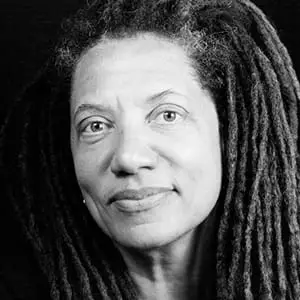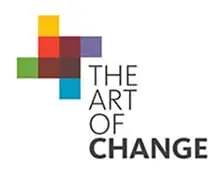Nikky Finney
 PHOTO RACHEL ELIZA GRIFFITHS
PHOTO RACHEL ELIZA GRIFFITHS“So—you can write pretty,” Toni Cade Bambara tells the twenty-one-year-old Nikky Finney during a monthly writing circle that Bambara held in her Atlanta home during the 1980s. “But what else can your words do besides adorn?” This flat-footed question, put to the young poet at the beginning of her career by the great short story writer, set Finney sailing toward a life of aiming her words to do more than decorate the page. She follows the path, beyond adornment, that Bambara lived and taught—a writing life rooted in empathetic engagement and human reciprocity.
Transcript
[The words “Art is” appear, followed by scrolling words…Empathy, Healing, Vision, Change, Beauty…it stops at Hope. Art Is Hope.]
Nikky Finney, poet: I feel like I’m a poet of my time. It’s important to remember the stories that help make me who I am. I’m reminded of stories of who I call the prophets of my day. People like Elizabeth Catlett and Romare Bearden and Nina Simone and James Baldwin. Those artists and those moments are crystallized in so many of our lives and in our hearts.
[Nikky reads a poem in her home.]
“And there are more new ones of us born every day… Slavish to things we cannot do without.”
Nikky: And so now I take those lessons learned from that time and bring them forward. Get your pen out, get your palette out, get your microphone out, and get to work.
[Nikky continues reading poetry.]
“Slaves, he said of them all, as he sat before their limited eyes.”
Nikky: These times that we live in are essential for artists to be doing what they are doing, and to be doing it times ten.
[The words “Art is” appear, followed by scrolling words…Hope, Expression, Change, Creativity, Vision…it stops at Justice. Hashtag Art Is Justice. Agree? Share this video.]
[Ford Foundation logo: a globe made up of a series of small, varied circles.]
Accessibility Statement
- All videos produced by the Ford Foundation since 2020 include captions and downloadable transcripts. For videos where visuals require additional understanding, we offer audio-described versions.
- We are continuing to make videos produced prior to 2020 accessible.
- Videos from third-party sources (those not produced by the Ford Foundation) may not have captions, accessible transcripts, or audio descriptions.
- To improve accessibility beyond our site, we’ve created a free video accessibility WordPress plug-in.
Nikky Finney has been a faculty member at Cave Canem summer workshop for African American poets, and a founding member of the Affrilachian Poets, a particular place for poets of color in Appalachia. She has been poet and professor for 23 years at the University of Kentucky, and visiting professor at Berea and Smith Colleges. She won the PEN American Open Book Award in 1996 and the Elizabeth O’Neill Verner Award for the Arts in South Carolina in 2016. Finney edited the Cave Canem anthology Black Poets Lean South (2007), and authored On Wings Made of Gauze (1985), Rice (1995), Heartwood (1997), The World Is Round (2003), and Head Off & Split, winner of the 2011 National Book Award for Poetry. Her acceptance speech was described by the 2011 NBA host, John Lithgow, as “the best acceptance speech ever—for anything.”
In her home state of South Carolina, Finney involves herself in day-to-day battles for truth and justice while also guiding both undergraduates and MFA students at the University of South Carolina, where she is the John H. Bennett, Jr., Chair in Creative Writing and Southern Letters, with appointments in both the department of English language and literature, and the African American studies program, which she proudly notes is 46-years strong. Finney’s work, in book form and video (and including her now legendary acceptance speech), is on display in the inaugural exhibition of the African American Museum of History and Culture in Washington, D.C. You will find her in the poet’s corner, directly across from Chuck Berry’s 1973 candy apple-red Cadillac Eldorado.
Finney’s work delves into the arenas of black girl genius unrecognized, black history misplaced and forgotten, and tells the stories of women who prefer to jump instead of ride the traditional tracks of polite and acceptable society. In her full body of poetry and storytelling, she explores the whispers and shouts of sexuality, the invisibility of poverty in a world smitten by the rich and the powerful, the graciousness of black family perseverance, the truth of history, and the grace and necessity of memory—as well as the titanic loss of habitat for all things precious and wild.
